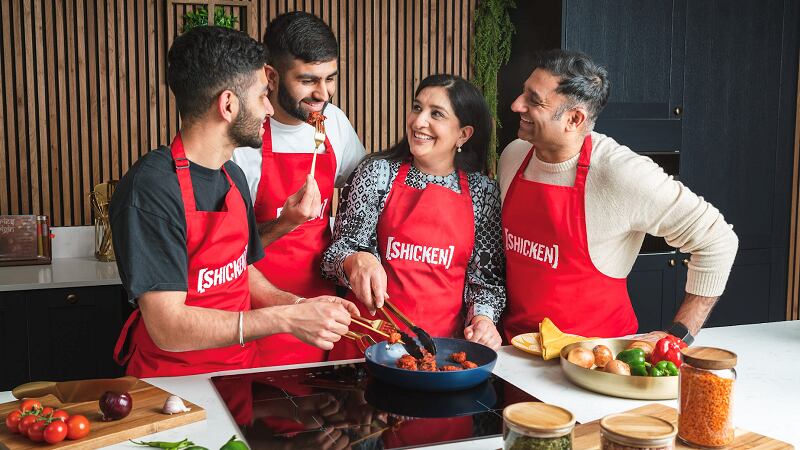Launched in 2020 by wife-and-husband team Parm and Satvinder Bains, UK-based SHICKEN offers a range of Asian curries and kebabs, featuring the brand’s plant-based chicken made from a blend of textured soy protein and wheat protein. Last month, SHICKEN took its first step into the US market, launching its products in 410 Sprouts Farmers Markets.
‘We are in control of our own destiny’
Shortly after the launch, SHICKEN revealed that Veg Capital made a $5.3m investment in the brand, bringing its total investment to $7.9m. With the capital, SHICKEN plans to expand its retail footprint globally — with the goal of 70% of its business coming from outside the UK — and further build out the company’s manufacturing capabilities, Bains explained.
“We built and fabricated a state-of-the-art manufacturing facility here in the UK. That facility has now been running for over 12 months. And the additional funding that we have received from our initial funder, Veg Capital, was actually to reinvest into new CapEx to continue the growth that we've seen organic growth we have seen over the last two to three years. And obviously, our export market, which includes North America ... is a very high focus for the business.”
SHICKEN explored various options to manufacture its product and initially considered working with a co-manufacturer, Parm Bains said. However, after failing to find a co-manufacturer that could deliver the quality they were looking for, the company took matters into its own hands and built a factory in 2023, where its products are created today, he added.
“Having invested heavily in manufacturing ourselves, we are in control of our own destiny. We are not relying on a contract manufacturer who can increase their prices due to market conditions or economic conditions. We can work more efficiently. We can manufacture more efficiently. We can buy more effectively in terms of the raw materials in order to control our cost control our overheads and maintain a margin that we are happy with. And I think being a manufacturer allows you that control over the market.”
Delivering on authentic Asian flavors, clean-label plant-based products
Initially releasing classic Indian dishes and flavors — including tikka masala, korma curry, madras curry, and more — SHICKEN now is developing products that are representative of different Asian heritages and cuisines, as consumers demand more of these flavors. Last year, Parm and Satvinder Bains toured Asia for inspiration for its SHICKEN's plant-based Teriyaki Kebab skewers.
“There is a real appetite for authentic Asian cuisine. Now, we started with Indian cuisine because of our culture and our heritage, and we are a family-run business. We want to bring our heritage and culture into everything that we do. But beyond Indian cuisine, We have already launched Japanese alternatives here in the UK with our chicken Teriyaki Kebabs, and the plan is to basically offer consumers regardless of where they are in the world, a real authentic Asian cuisine whether that be Indian, Japanese, Thai, Chinese, Malay, anything that has spice relates back to our heritage and our culture.”
Just as they are looking for more Asian flavors, consumers' behaviors around plant-based meats have changed, as many are now seeking cleaner-label products, Bains said. In a global survey of 6,800 consumers, GlobalData found that 46% of consumers said they were extremely concerned about how much processed plant-based meat, seafood, and dairy they eat, and 45% said they were quite concerned.
"We are now seeing not only in the US but also here in Europe, where consumers are selecting products that are of high quality and not just trying to capitalize on the growth of the plant-based category. They are being far more selective on quality, country of origin, manufacturing statuses, and also the ingredients that are being used on the back of pack," Parm Bains said.
He added, "When I'm faced with a product that has so many ingredients on the back of pack that I can not recognize as a consumer, is it really that much healthier for me? So, this is a position that we have taken very early on that we want to keep our recipe as clean as possible. ... Consumers — whether they are in the US or in Europe — will find those ingredients in their home-store cupboard or in their grocery cupboard, whether that be spices, whether that be onions, or whether that be a combination of ingredients that we have within our products."


